In the world of desserts, there’s a captivating creation that has taken both seasoned bakers and novices by storm – the Basque cheesecake. This delightful treat is not your average slice of sweetness; it’s a symphony of flavors and textures that has redefined the art of making cheesecake. Join us on a journey to uncover the secrets of crafting the perfect burnt cheesecake, from its humble beginnings to its luscious burnt top.
Table of Contents
A Taste of History: The Birth of Burnt Cheesecake
Hailing from the picturesque Basque Country in Spain, this dessert is steeped in history. Born out of culinary experimentation, the Basque cheesecake emerged as a unique twist on the traditional dessert. It dares to embrace imperfection with its caramelized, slightly burnt top and its creamy, jiggly interior. While its origins can be traced to the humble kitchens of Basque homes, it has quickly become a sensation worldwide, captivating taste buds with its contrasting textures and alluring flavors.
Crafting Homemade Elegance: The Allure of Basque Cheesecake
Creating a Basque cheesecake at home is an endeavor. That promises not just a delicious dessert but an experience that connects you with centuries of culinary evolution. The beauty of a homemade cheesecake lies not only in the outcome but also in the journey of crafting it. You can recreate the magic of this elegant delicacy within the comfort of your kitchen. Just with a few essential techniques and a sprinkle of creativity.
Mastering Simplicity: The Art of Easiest Cheesecake
Contrary to its sophisticated appearance, making Basque cheesecake is an art that is accessible to both seasoned bakers and those just starting their culinary journey. The secret lies in its minimalist ingredient list and straightforward preparation techniques. Cream cheese, eggs, sugar, and a touch of flour form the base of this masterpiece, creating a canvas for the rich flavors to unfold.
The Enigma of Burnt Basque Cheesecake: A Caramelized Wonder
One cannot discuss Basque cheesecake without diving into the phenomenon of burnt cheesecake. This variation of the classic dessert is an embodiment of artful contradiction. An intentionally burnt exterior that gives way to a velvety, creamy interior. The technique behind achieving the perfect burnt top involves baking the cheesecake at a high temperature and coaxing the sugar to caramelize. That will create a flavor profile that’s as enchanting as it is unique.
Flavors and Variations: Exploring the World of Basque Cheesecake
While the classic Basque cheesecake stands tall as a testament to simplicity and elegance, the world of variations offers a playground for culinary experimentation. Imagine infusing the batter with zesty citrus notes, drizzling it with luscious caramel, or adding a playful dash of spices. Your imagination will be your only limit, allowing you to curate a cheesecake that resonates with your taste preferences.
Tips and Tricks: Navigating the Path to Cheesecake Perfection
As you embark on your Basque cheesecake journey, a few tips and tricks can pave the way to success. To avoid cracks, ensure that your ingredients are at room temperature before mixing. When incorporating the flour, do so gently to maintain the desired airy texture. Patience is key when baking – while the top might appear slightly burnt, remember that it’s all part of the allure.
FAQ: Burnt Basque Cheesecake
Common Questions About Burnt Basque Cheesecake
1. What is the secret to the perfect burnt top?
The secret to a perfect burnt top is patience and high heat. Baking the cheesecake at a high temperature for a longer period allows the top to caramelize beautifully.
2. Can I use a different type of cheese?
While cream cheese is traditionally used, you can experiment with other types of cheese, such as goat cheese or ricotta. However, the texture and flavor will be different.
3. Can I make this cheesecake gluten-free?
Yes, you can make this cheesecake gluten-free by using gluten-free flour.
4. How long can I store leftover cheesecake?
Leftover cheesecake can be stored in the refrigerator for up to 3 days.
5. Can I freeze Burnt Basque Cheesecake?
Yes, you can freeze the cheesecake for up to 2 months. Thaw it overnight in the refrigerator before serving.
Related Spanish Recipes
While Burnt Basque Cheesecake is a relatively new culinary sensation, Spain boasts a rich history of delicious desserts. Here are a few classic Spanish desserts to try:
- Flan de Huevo: A creamy custard dessert with a caramel topping.
- Tarta de Santiago: A traditional almond cake from Galicia.
- Churros: Crispy, deep-fried dough sticks typically served with hot chocolate.
- Crema Catalana: A Catalan custard dessert similar to crème brûlée.
- Torrija: A sweet bread pudding typically enjoyed during Easter.
Indulgence on a Plate: Savoring Burnt Basque Cheesecake
Serving a slice of burnt cheesecake is an experience that transcends the culinary realm. As your fork glides through the caramelized top, it unveils the sumptuous creaminess within. The interplay of textures and flavors is a symphony that captivates your senses, leaving you yearning for another bite.
In conclusion, the Basque cheesecake is more than a dessert; it’s an art form. Its journey from the kitchens of Basque homes to global recognition is a testament to its timeless appeal. As you embark on the adventure of making your burnt cheesecake, remember that each step is a brushstroke on the canvas of culinary creativity. So go ahead, embrace the imperfections, master the technique, and savor the allure of Basque cheesecake – a truly exceptional creation that has won hearts and taste buds around the world.
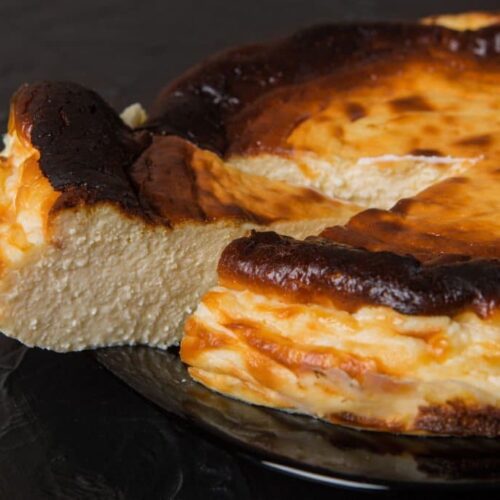
Amazing 6 Steps Guide Burnt Basque Cheesecake Recipe
Ingredients
- 600 g Cream cheese (at room temperature)
- 200 g Granulated sugar
- 4 Large eggs (at room temperature)
- 400 ml Heavy cream (whipping cream)
- 1 tsp Vanilla extract
- 20 g All-purpose flour
- A pinch of salt
Instructions
- Preheat the Oven: Preheat your oven to 200°C (390°F).
- Prepare the Pan: Grease a 9-inch (23 cm) round cake pan with butter or line it with parchment paper. The parchment paper should hang over the sides of the pan to make it easier to remove the cheesecake later.
- Mix batter:Whisk cream cheese until it becomes creamyAdd heavy cream and sugar and and keep whisking.Mix in flour and vanilla extract until combined.Beat in eggs one at a time until just incorporated.
- Bake:Pour the batter into the prepared pan.Bang the pan on the counter to release air bubbles.Pop any remaining bubbles with a knife.Bake for 45-55 minutes, until the top is well-caramelized and the center is slightly jiggly.
- Cool: Remove the cheesecake from the oven and let it cool in the pan for about 20-30 minutes. It will continue to set as it cools.
- Chill: Once the cheesecake has cooled to room temperature, transfer it to the refrigerator and let it chill for at least 3-4 hours or overnight. Chilling helps the flavors develop and the texture to firm up.
Notes
- The eggs contribute to the cheesecake’s texture and richness.
- Make sure the eggs are at room temperature for easier incorporation.
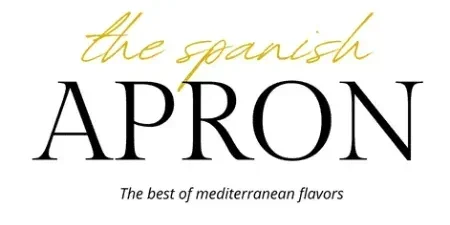
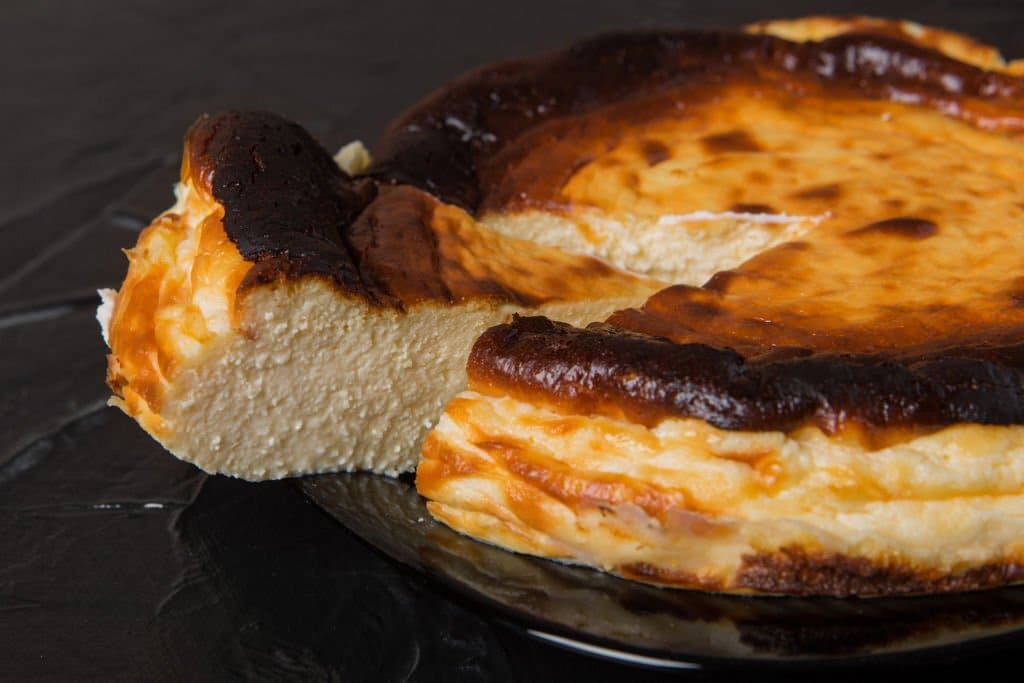
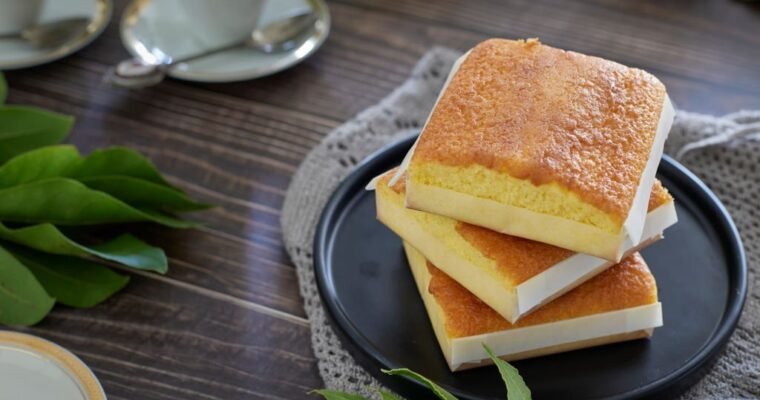

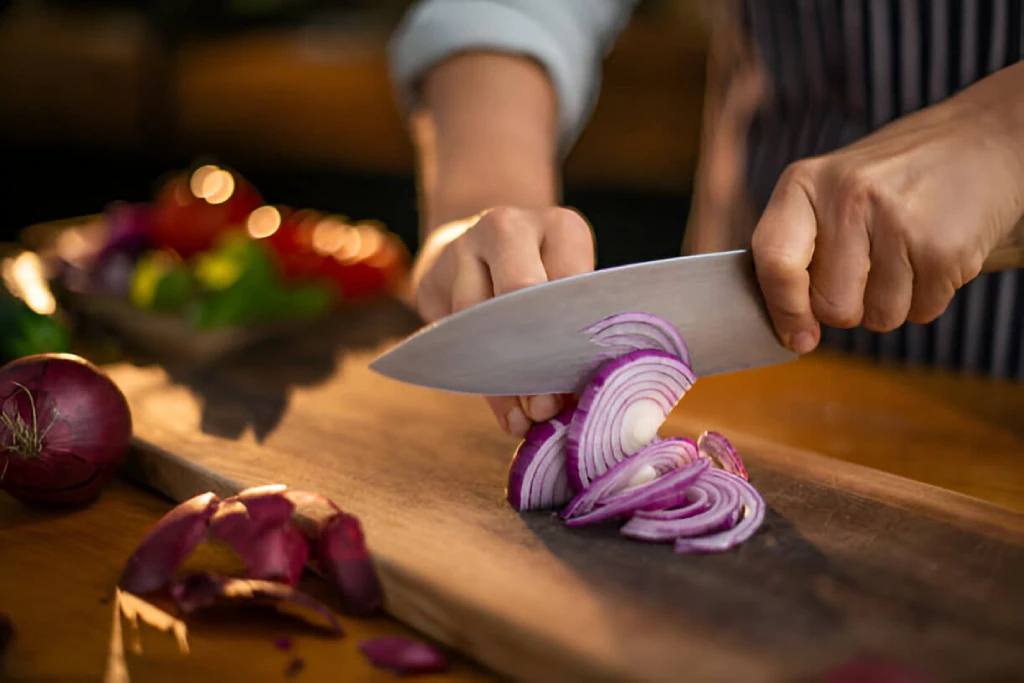




I don’t see you adding the cream in the basque cheesecake mix?😳
You were right I forgot it, my bad. The heavy cream is added in the step number 2, just before the cream cheese and along with the sugar. Thank you for commenting!
Do you recommend a convection oven for a darker top and if you do what temp?
In a convection oven you have to pay special attention to the temperature because the food cooks faster than in a conventional oven. Of course, you can use it for the cheesecake but keep in mind that if you give it too much temperature it will be overcooked on the outside and inside it will be too liquid. Therefore, set the temperature to 165 degrees Celsius (325F) so that it cooks well on the inside and if you see that the top is not burnt on the outside you can give it more temperature the last minutes to get it or use a kitchen blowtorch when you take it out of the oven until you get the desired burnt. I hope I have solved your question. If not, let me know. Thanks